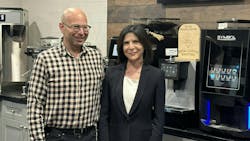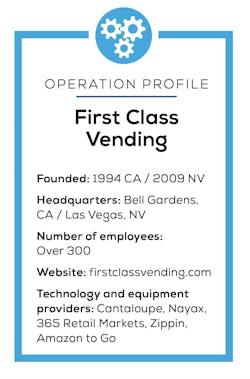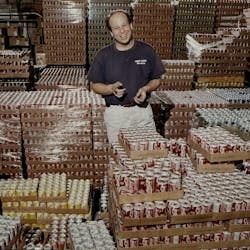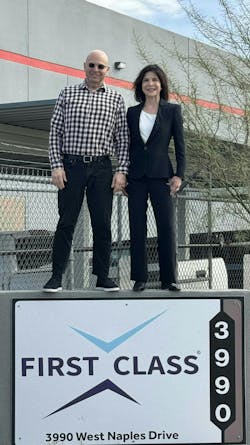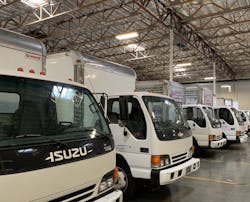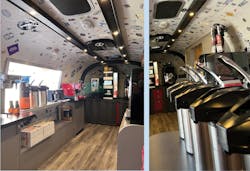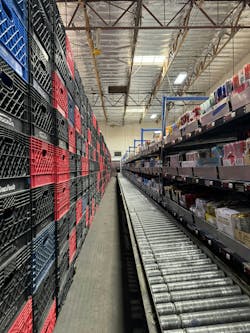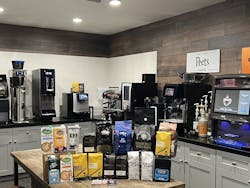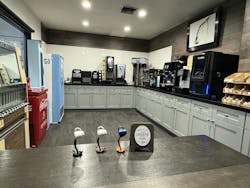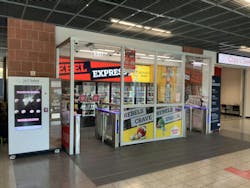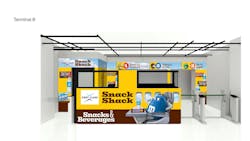When Matthew, Ryan and Michelle Marsh started First Class Vending in 1994, they never envisioned what it would become three decades later. In just 30 years, First Class Vending has grown from two employees to more than 300 employees; from one location and warehouse to nine warehouses across three states; from soda-only vending machines to full-service vending, micro markets, OCS and frictionless stores.
The company has been thriving in the Southern California, Nevada and now Arizona vending markets due to the ownership’s hard work, tenacity, propensity for innovation, employee-centered approach and its desire to challenge the vending industry status quo.
Humble beginnings
First Class Vending’s story begins in 1994 when Matthew and Michelle were in college. Matthew purchased vending machines and placed them in fraternity houses around campus, “to earn extra money to take Michelle on dates,” Matthew said with a chuckle.
When the pair graduated college and got married, they decided to take out a loan and purchase a small mom-and-pop vending operation. While Michelle went on to work in the social services field, Matthew ran the vending company, with himself and one driver.
“I moved the first 600 machines myself on the back of a 4x8 trailer,” he recalled. “I put a vending machine on the back and wouldn’t go home until I found a place for it.”
Ryan, Matthew’s brother, joined the company in the early days after he graduated college and played a significant role in growing the company over the years. As the company grew, it expanded throughout the Los Angeles area to include Los Angeles, Orange, Riverside, San Bernardino, San Diego and Ventura counties.
“We started with vending machines that didn’t have dollar bill acceptors,” said Matthew. “I had to manually cut holes in the machine to add acceptors.”
After a few years in the business, Ryan became a partner at First Class Vending. Year after year, the company continued to see growth. Even during economically uncertain periods, the organization, under Marsh’s leadership, dug in and embraced the challenge. In fact, when the 2008 financial crisis hit, Matthew saw an opportunity to expand. While other vending operations were closing their doors, in 2009, Matthew opened a First Class Vending branch in Las Vegas with one manager, one employee and no customers.
“We started over grassroots,” recalled Matthew. “And this non-family business became a family business over the years.”
After eight years of commuting back and forth from Los Angeles to Las Vegas, Matthew and Michelle moved permanently to Nevada in 2017, and Michelle left her work in social services and joined the company full time.
Today, First Class Vending has operations in Southern California, Nevada and Arizona, a branch that was opened in 2021 during the pandemic. While Ryan oversees the California division, Matthew works with customers and oversees the sales team. Michelle, meanwhile, has embraced her role as owner and president of the First Class Vending Nevada branch, working on daily operations and employee retention.
Happy employees, happy customers and successful company
For their organization to be successful, Matthew and Michelle believe in supporting and promoting an enjoyable environment, which has meant focusing on employee retention and customer retention. “Happy employees lead to happy customers,” said Michelle. “When it comes to employees, we realize that everybody has something going on in their personal lives, so if we can make this company an environment where employees feel supported, then that translates into a more efficient workforce.”
When Michelle joined the company full time in 2017, she began observing every department to see how management could change to have better communication and teamwork despite the many moving parts. She began pragmatic practices to build employee confidence and retention. First, she began meeting with every employee one-on-one at the Nevada branch once per year to hear feedback.
“It’s not a meeting about job performance or raises,” she said. “This is about any feedback that they have, and I try to implement changes based on the feedback that I get. I don’t want to see people coming to work with a question mark over their head or feeling resentful.”
Next, she tries to make sure she is in every interview, so she has an idea of the potential employee’s background. It’s the personal relationship that management creates with its employees that makes First Class Vending different from many other competitors. Despite having more than 200 employees at its Nevada operation, Michelle continues to write birthday and anniversary cards each month for employees.
“It really helps to work as a team when everybody feels like they are part of something,” she emphasized. “We have really gotten a lot of good feedback from employees about the changes we’ve made.”
And, the company remains committed to its employees because, “if we aren’t solid in the backend, then we aren’t going to retain the customers,” Michelle added. “We like to tell folks in interviews that all companies sell the same bag of Cheetos, but if a customer likes you, they like us.”
Not only is the company committed to its employees but it also shows a commitment to customers by offering the newest innovations to make their purchasing experience even better.
Coffee on the Go
In order to showcase its coffee offerings, First Class Vending opened a warehouse and showroom at its Las Vegas operation for hotel and restaurant managers to sample the product for themselves. “That makes a huge difference,” said Matthew. In Las Vegas, traveling to the showroom isn’t difficult for prospective clients, so many are willing to make the drive. “We have customers all week long coming in, and we teach them everything they need to know about coffee, from how the machines work to running whole coffee houses.” During the pandemic, the company converted a 1968 Airstream into a mobile showroom for customers who preferred not to travel. “Now we have the ability to go to them and have different coffee tastings,” said Matthew.
The early adoption of micro markets
From the beginning, First Class Vending hasn’t shied away from trying new things, including technology. The company works with clients to test new technology, specifically in its Nevada operation. “If it works, we are happy and may integrate it throughout our company. If it doesn’t, we send it back. We aren’t afraid to try things,” said Matthew. “There are a lot of headaches that come with trial, but if you don’t try, you don’t know.”
First Class Vending was an early adopter of micro markets, opening its first Avanti market shortly after they were introduced. They used the micro market concept to acquire new business, and once they proved to be successful, the company began converting traditional vending accounts over to micro markets. Matthew says that since customers can touch and feel the product, they tend to spend a bit more money in micro markets.
Although Matthew has had good experiences with micro markets, he acknowledges that theft can be an issue if a vendor isn’t managing accounts properly. “I have seen a trend in the industry where some people have been talking about transitioning back to vending in high-theft accounts,” he said. To combat this, First Class Vending has a surveillance team monitoring micro market theft.
From its inception, First Class Vending has worked hard to provide customers with superior offerings. That has also meant pivoting operations to fit customer needs as they change. That includes reintroducing office coffee service (OCS) in 2018 after selling off OCS accounts in the early 2000s to focus on vending.
OCS and beyond
Thinking back to the early 2000s, Matthew recalls a period where operators were choosing to focus on either vending or OCS, not both. Those operators focusing on vending sold off their OCS routes, and the OCS operators sold off their vending routes. First Class Vending sold its coffee routes and decided to focus on vending, because at the time, it’s what they did best.
“Some of the coffee companies sold off their vending routes to us, and we basically did a big switch,” said Matthew. “We focused on vending while they focused on coffee.”
That model seemed to work for a short period of time before it was disrupted by the introduction of micro markets. “One day I found out that I lost a vending account to an OCS operator because they were doing micro markets,” recalled Matthew. “It surprised me at the time, but that’s when I knew we needed to open coffee again. In my opinion, the industry changed back to all-in-one services because of micro markets.”
First Class Vending reintroduced coffee service seven years ago. In Nevada, the company now operates traditional OCS, restaurants, hotels and more recently, a cafe. “Anything that touches coffee in Nevada, we do,” Matthew explained. “We service a high percentage of restaurants with espresso, coffee and iced tea machines, which makes us different from other operators.”
In addition, First Class Vending offers third-party maintenance for restaurants that have their own equipment, due to the acquisition of a local mechanical OCS repair company. First Class Vending recently opened a cafe in partnership with Death Wish Coffee in a Las Vegas hotel, supplying the store a range of cups and sugar to coffee and espresso machines.
Across the board, Matthew prefers selling quality coffee and does everything he can to avoid selling customers the value brand.
“We prefer selling local and specialty coffee,” he said. “We want our customers to understand that the price between a value brand and a premium brand, when you break it down by the cup, is not much of a difference.”
The company prides itself on carrying brands that other vendors don’t, including a local Nevada roaster, Royal Coffee Roasters.
Despite leaving the coffee business for several years, Matthew was not intimidated by the changes his company may have missed. “The coffee bean hadn’t changed, and the addiction to caffeine hadn’t changed, either,” he said. “What had changed was the technology and equipment, and it had only gotten better.” He noted that the adjustment to the new equipment and logistics was simple.
One thing he was sure to implement, however, was having separate routes. “A true OCS operator cannot throw coffee boxes in the back of a vending truck and expect a vending route driver to deliver it,” he said. “We have two separate routes, and we send two trucks to the same location because they go on different frequencies. Some of our coffee drivers are also really good at sales, and they will help promote seasonal items that we have and new products that come up.”
Today, the company has grown to more than 20 OCS routes in Nevada.
Frictionless stores remain an area of trial
Matthew and Michelle have always welcomed new ideas and offerings, and that’s what led them to First Class Vending’s first frictionless store. The company launched Zippin, a checkout-free store, six months ago, and has plans to open two more frictionless stores in the Harry Reid International Airport in the next two months. As with any new technology and offerings, frictionless stores have proven to be a learning curve for the First Class Vending team. The barrier to entry so far has been cost.
He believes that as more companies come out with this type of selling model, the price will come down to make it more affordable. “We’ve got one foot in and the other foot will go in soon as we see more sales and see if the pricing goes down,” he said.
Despite the barrier to entry, he believes the concept is working well so far, and he sees a future in it. “They are designed for honest people to make a purchase and for dishonest people to not be able to use them,” he continued. “That part of it works.”
Another issue he has seen come up is the label that these stores are given. “We’ve had customers treat this like vending and micro markets and say we are good to launch the concept, while others don’t know what to call it and then designate it as retail, which requires extra permits. So, it matters who you’re working with and what they consider it,” continued Matthew. “Is it a retail store? No. Is it vending? No.”
Another thing he has noticed is that the software of the frictionless store isn’t integrating with traditional vending software, which he believes will need to happen before more operators in the industry adopt this new model.
Vending of the future
Since 1994, First Class Vending has shown a proclivity to succeed. When Matthew first started with soda machines, he doubled his business by adding a snack machine next to each one. When micro markets were introduced, he became an early adopter and still believes in them today.
“Vending isn’t just vending anymore,” Matthew said. “It’s micro markets, locking coolers, and walk-out technology such as frictionless vending.”
Throughout its 30 years in the industry, First Class Vending has redefined and re-evaluated the services it provides, all for the benefit of the customer. “We have been pivoting since day one,” said Michelle. “We have been re-evaluating on a continuous basis because we don’t want to be on autopilot and we don’t want to become comfortable.”
About the Author

Adrienne Klein
Contributing Editor
Adrienne Zimmer Klein is a freelance writer with a background in the vending, micro market and office coffee service industry. She worked as an associate editor and managing editor at Automatic Merchandiser and VendingMarketWatch.com from 2013 until 2017. She is a regular contributing writer at Automatic Merchandiser.
